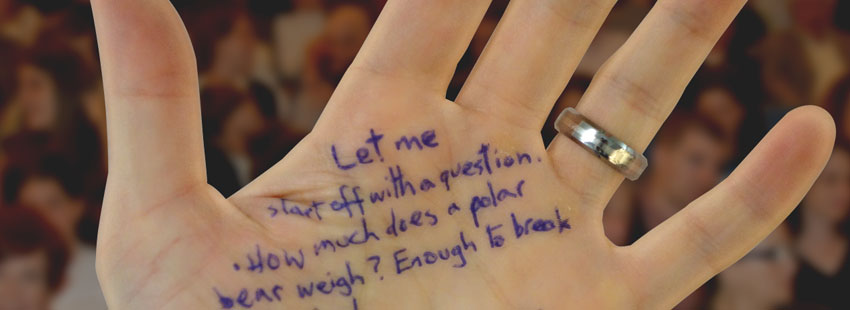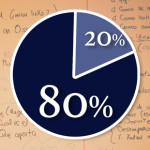Are you a credible speaker? Not if you’re using notes, you aren’t. Let me tell why notes are bad, and how you can get rid of them.
Why speaking from notes is bad
- Notes prevent you from making good eye contact and really connecting with your listeners.
- If you are reading notes from behind a podium, you are confining your available speaking area and shielding yourself from your audience.
- If you are holding notes or cue cards in your hands while you speak, you are limiting your ability to use effective body language.
- Notes limit your ability to ad-lib and project authenticity, since you will have a tendency of sticking to your script like glue.
- Speaking from notes makes you sound scripted and insincere.
- Having to rely on notes during your presentation will diminish your credibility. No expert really needs notes to speak to his/her subject, right?
How to get rid of your notes
If trashing your speaking notes sounds like a daunting task, don’t worry. Here are some techniques that will help you ease into a smooth, natural, paperless speaking style:
- Memorize your outline: First of all, write down the outline of your presentation (if you’re not sure what a proper presentation structure looks like, see my “Opening, Body, Conclusion” article). The outline should be high-level, in bullet points. The only text you are allowed to write out and memorize in full is the very first, and very last sentence of your speech, so that you know exactly how to begin, and how to end, your presentation, keeping it tight and on point. Your outline will enable you to speak naturally and better connect with your audience, while keeping you on track from beginning to end.
- Know your material like the back of your hand. This shouldn’t be too hard. If you are presenting, it’s because you already know your stuff well enough for someone to want to actually hear what you have to say. With your outline memorized, practice running through your presentation until you are comfortable with all the transitions. Since you aren’t tied to any script, you should easily be able to modify your presentation every time you run through it.
- Consider writing out a script only once. Although it is imperative that you do not memorize a script, it will sometimes be useful to write out an initial text. Why? Because the writing process gives you time to think, and illicites a higher degree of language than you would normally have access to when trying to speak in real-time, with a natural speaking rhythm. However, be careful with this approach, because you’ll have a tendency to want to read from your text each and every time you practice your presentation. Don’t let this tendency get to you. Once you’ve found the words you want to use and written them down once, put your notes away. You’ve already internalized what you might say. It’s time to let your natural speaking style take over.
- Use stories to illustrate your points as often as possible. Stories are the single most effective means of conveying a message. Everyone loves a good story. And, best of all, stories are easy to ad-lib on. All you need is the basic plot, and you can enhance, stretch out, emphasise, and elaborate on any part of the story you’d like. With a few good stories, a 10-minute presentation can easily become 30-40 minutes long, if need be, and be even more memorable at that!
The exceptions (when using notes is actually OK)
By now, you should be getting the message loud and clear: stop using notes when presenting! “But David”, you ask, “is there ever a time when using notes is actually OK?” Well, yes, in fact, I’m glad you asked. It is appropriate to use notes in the following circumstances:
- Direct quotes: If you are quoting word-for-word from another text, it is OK to read the quote. Please ensure your audience knows who you are attributing the words to, and keep you notes near eye level.
- Listing facts: When you are providing specific facts, your use of notes will convey a sense that you are being exact with your information – there is no way you could be getting your facts wrong!
- Using a prepared speech: It is sometimes necessary to stick to the script if you are reading a speech that was prepared for you by someone else for a particular event or occasion. These speeches often contain specific information that must be communicated to a specific audience.
When you put your notes away, you will better connect with your audience by being more authentic, using more effective body language, and appearing more credible with your material. It is a daunting challenge, but one that is well worth it. Good luck!
Do you have any other tips on how to stop using notes while presenting? Please share your thoughts in the comments section below.
Feature image credit: Photo by David Folkerson, Background photo by David Shankbone / CC BY-SA 3.0


 Senior communicator | Team leader | Web and social media expert | Strategist.
I love making new professional acquaintances. Reach out if you want to talk communications, marketing, or ultimate frisbee.
Senior communicator | Team leader | Web and social media expert | Strategist.
I love making new professional acquaintances. Reach out if you want to talk communications, marketing, or ultimate frisbee.






2 comments
Join the conversationAngela Florcke - January 2, 2015
Interesting post! Also, a good thing to remember is that if you forget something or say something out of sequence, no one will know but you!
David Folkerson - January 3, 2015
Hi Angela, good point! No reason to let anyone know you forgot part of your speech 😉